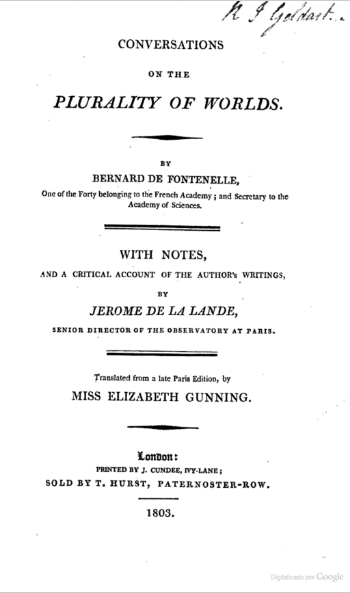
Libraries
Libraries
Conversations about the plurality of worlds, de Bernard Le Bovier de Fontenelle (1686)
Fontenelle was a French philosopher of the seventeenth and eighteenth centuries, a lawyer by profession and especially known among the European illustrated circle for his book Conversaciones acerca de la pluralidad de los mundos (Conversations about the plurality of worlds). This is a pioneering text among books of scientific dissemination, not only for its simple prose and the breakdown of contemporary theories for the easy access of its readers, but also for directing this book to the female audience. Fontenelle also used the dialogue to express his thoughts and, in this case, personified the female audience by the character of the Marquesa, who served as his counterpart in the book, she was a receiver and a student of the knowledge given by the author.
It is not surprising at this point that due to the strong influence that Cárdenas had, from several authors, he wrote his own manuscript in the form of dialogue. Although the reference to Fontenelle’s text is tiny and framed in a technical discussion on other subjects, it is evident the knowledge that Cardenas had about this work of the French philosopher. It is possible that Cárdenas did not read the book directly, since his first edition in Spanish appears to be from 1796. It is reasonable to argue at this point whether Cárdenas learned to read French or not. While he explicitly says at one point that he has read a text in French, it is always possible that the references in French, were indirect and related by a third person.
He does, for example, mention that a third person that helps him to translate a Latin text, which he cannot read. Thus, as an isolated element, this reference to Fontenelle could be considered minor, but in the situation that Cárdenas had a self-taught education, it ends up being important that this type of works fell into his hands and were used as reference. It is not a technical book, but an informative and training text, that shows how wide was in the end, the intellectual knowledge of Cárdenas. Finally, this book is articulated on the basis of the Copernican model of planetary movement, and Cárdenas mentions, in an early part of his book, the model quite accurately.

